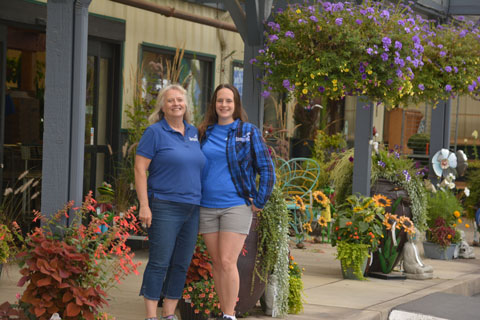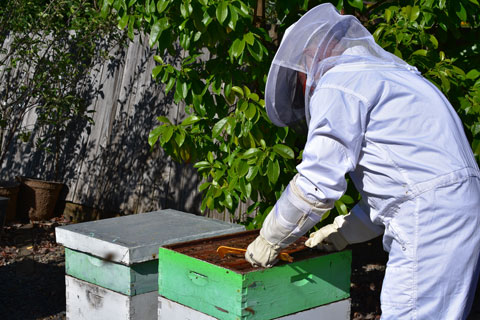10/1/2021
Diversified Success
Ann-Marie Vazzano

Shonnard’s Nursery, Florist and Landscape in Corvallis, Oregon, isn’t your typical garden center. Being a retail nursery, florist, landscape contractor and holiday lighting specialist means there’s not a lot of downtime. But that’s a good problem to have, according to Lynnette Shonnard, who started the business in the mid-1980s with her husband Chris.
“That diversification just opens us up to be top of mind and that’s helped us all the way around,” Lynnette explains.
Pictured: Co-founder Lynnette Shonnard with her daughter and co-owner/manager Andrea Shonnard.
Andrea Shonnard and her brother Joel were just kids when their parents purchased Flower Land West and gradually transformed it into the family business it is today. Now, Andrea runs the retail component as co-owner/manager, overseeing purchasing and helping to run the floral department. She also handles staff development. Joel runs the landscape, maintenance, pond and holiday lighting divisions. Having all these divisions under one roof gives Shonnard’s a distinct advantage.
“Most landscape companies don’t have a store that customers can just walk into and talk to someone, and it really allows us to take care of almost everything in the landscape for those customers,” Andrea says. “They really enjoy being able to come and get face-to-face interaction.”
The landscape trucks are adorned with bright, attractive graphics, too, which Andrea says is a great reminder for customers to come and visit the garden center. In other words, each entity works to draw attention to the other and enhance business on both ends.
One-Stop Shop
Unlike many retail garden centers, plants aren’t the top sellers at Shonnard’s. In fact, landscape/non-plant soil is the number one category, making up 11% of sales, followed by hardgoods at 10.3%. Annuals come in third at 9.8%.
But it wasn’t always this way. Because of the frequent rainfall in the region, bagged goods became quickly water-logged and heavy. In 2017, however, the garden center invested in a cover for the main bagged goods area. Now that the bags are covered, they weigh less, making it easier for both staff and customers to grab and load the items.
That’s not the only reason for the high non-plant sales, though. Andrea attributes much of this success to the garden center’s robust cross-merchandising efforts.
“If you have the flower, you’d better have a good pot. You need soil. You need fertilizer. You need all those things,” she says.
To ensure customers get everything they need to be successful, Shonnard’s places premium soil bags and plant food on end caps near the plants. And because frost is common during much of the season, incorporating covers for the plants into the displays gives customers the confidence to plant a little earlier, knowing they have the means to protect their plants from the elements.
In addition to strategically placing these add-on items, a dedicated staff member is in charge of signage to explain the purpose of each product.
“It’s not just, ‘This is what you need.’ It’s more like, ‘This is why you need it,” Andrea explains.
This follow-through helps ensure the add-on sales lead to gardeners’ success, which is important for retaining loyal customers.
Education
Education is a key component for Shonnard’s, too, on both the customer and employee front. In a typical year, the garden center offers at least 30 free classes. Although the pandemic put a damper on in-person learning opportunities last year, they were able to keep the classes alive via YouTube and Zoom. But there’s more to it than just educating customers.
“We want to make successful gardeners and with that comes staff education,” Andrea says, adding that if staff members are interested in a class or conference, Shonnard’s will do whatever they can to get them there. In addition to improving customer service, fostering employees’ growth helps them feel appreciated, Andrea notes. And happy employees lead to happy customers.
Bee Happy
 The “Birds and Bees” department at Shonnard’s makes up 7.5% of total sales, thanks in part to the wide range of beekeeping supplies the store sells. In addition to hive components, tools, protective gear, honey and the bees themselves, the store offers in-hive and in-store consultations for beekeepers, as well as on-site beekeeping classes. The result is a loyal beekeeper customer base, including shoppers who come from as far as four hours away to get supplies.
The “Birds and Bees” department at Shonnard’s makes up 7.5% of total sales, thanks in part to the wide range of beekeeping supplies the store sells. In addition to hive components, tools, protective gear, honey and the bees themselves, the store offers in-hive and in-store consultations for beekeepers, as well as on-site beekeeping classes. The result is a loyal beekeeper customer base, including shoppers who come from as far as four hours away to get supplies.
Pictured: Camille Dill is the resident beekeeper on staff. Photo credit: Ashlea Varnado.
“There’s a positive side of having more awareness to our building and our business because we have that department,” Andrea says. “People come to us who didn’t even know we existed because of the bee department.”
Those beekeeper customers often become loyal plant customers, too, because the seasonal blooming plants the store offers double as bee forage. Andrea says this has been a boon to the native plant department. Thanks to the region’s relatively temperate climate, there are at least some native varieties in bloom for 90% of the season. Beekeepers are often excited to discover these plants when shopping for other bee-related products in the store.
Shonnard’s makes sure to educate customers, too. In addition to the beekeeping classes and online tutorials, the store provides handouts that highlight the different types of pollen and edibles for the bees.
“We want to educate them so that they can do it properly and well, and be successful,” Andrea says. “That’s a big goal of our business.” GP